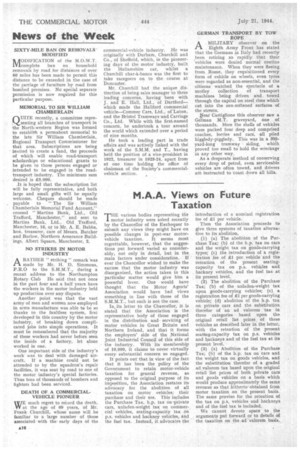M.A.A. Views on Future Taxation
Page 18

If you've noticed an error in this article please click here to report it so we can fix it.
THE various bodies representing the motor industry were asked recently by the Chancellor of the Exchequer to submit any views they might have on possible changes in post-war motorvehicle taxation. It seems most regrettable, however, that the suggestions put forward varied so considerably, not only in detail, but in the main factors under consideration. If ever the Chancellor wished to make the excuse that the motor industry was• disorganized, the action taken in this particular matter would give him a powerful lever. One would have thought that the Motor Agents' Association would have had views something in line with those of the S.M.M.T., but such is not the case.
In its letter to the Chancellor, it is stated that the Association is the representative body. of those engaged in the distribution andservicing of motor vehicles in Great Britain and Northern Ireland, and that it forms the employers' side of the National Joint Industrial Council of this side of the industry. With its membership of 10,000, it claims to cover virtually every substantial concern so engaged.
It points out that in view of the fact that it has been the policy of the Government to retain motor-vehicle taxation for general revenue, as opposed to the original purpose of its imposition, the Association restates its advocacy for the abolition of all taxation on motor vehicles, their purchase and their use. This includes the Purchase Tax, h.p, tax on 'private cars, unladen-weight tax on commercial vehicles, seating-capacity tax On p.s. vehicles and hackney vehicles, and the fuel tax. Instead, it advocates the introduction of a nominal registration fee of El per vehicle.
Then the Association proceeds to give three systems of taxation alternative to its abolition.
(1) (a) The abolition of the Purchase Tax; (b) of the h.p. tax on cars and the weight tax on goods-carrying types; (c) the introduction of a registration fee of £1 per vehicle and the retention of the present seatingcapacity tax on p.s. vehicles and hackney vehicles, and the fuel tax at its present level.
(2) The abolition of the Purchase Tax; eh) of the unladen-weight tax upon goods-carrying vehicles; (c) a registration fee of £1 per goods-carrying vehicle; (d) abolition of the h.p. tax on private cars and the substitution therefor of an ad valorem tax in three categories based upon the original retail list prices_ of these vehicles as described later in the letter, with the retention of the present seating-capacity tax on p.s. vehicles and hackneys and of the fuel tax at its present level.
(3) (a) Abolition of the Purchase Tax; (b) of the h.p. tax on cars and the weight tax on goods vehicles, and the substitution therefor of a graded ad valoretn tax based upon the original retail list prices of both private cars and goods vehicles on a basis which would produce approximately the same revenue as that hitherto 'obtainedfrom motor taxation on the present basis. The same proviso for the retention of the tax on p.s. vehicles and hackneys and of the fuel tax is included..
We cannot devote space to the arguments put forward or to details of the taxation on the ad valorem sbasis.,




















































